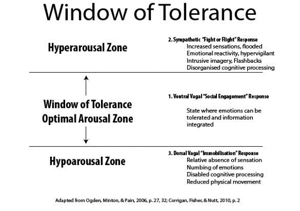A sense of a foreshortened future, feeling disconnected from loved ones and feeling keyed up…. these are some of the results of working in the trenches with COVID-19. Sometimes it takes a while for these normal yet challenging responses to sneak up on us. Other times, we have a very traumatic shift at work or patient interaction, and we experience these or other reactions immediately. Prevention strategies, recognition of signs and symptoms and self-care are key to your ability to stay healthy, grounded and effective.
With most of the focus right now being on virus reduction and prevention, the psychological impact of COVID-19 can be overlooked. For those working on the frontlines of healthcare, the psychological impact can be minimized due to the need to stay “on” and in the trenches. It can be difficult to do the necessary “self-check” to recognize psychological impact when we are responding to the acute needs and crises of our patients.
This “self-check” requires having self-awareness and being willing to accept help from others. As we do an honest check-in, we might recognize the signs and signals of posttraumatic reactions. According to the American Psychological Association, physicians dealing with posttraumatic reactions may “relive the (traumatic) event via intrusive memories, flashbacks and nightmares; avoid anything that reminds them of the trauma; and have anxious feelings they didn’t have before that are so intense their lives are disrupted”. These are very normal reactions to abnormal events that have pushed us out of our “Window of Tolerance”.
Window of Tolerance
 Borrowing from the field of trauma treatment, the Window of Tolerance framework is a very effective strategy in recognizing how we and others are doing in times of stress and trauma.
Borrowing from the field of trauma treatment, the Window of Tolerance framework is a very effective strategy in recognizing how we and others are doing in times of stress and trauma.
We all have a Window of Tolerance that is wider or narrower on any given day or time of day depending on how we slept, if we are hungry and any other number of factors. When our Window of Tolerance is large, we can tolerate more and in general, feel like we can manage the demands of the day. There are many factors that impact our ability to have a large Window of Tolerance. If we are experiencing physical pain or feeling isolated from our loved ones for example, our Window becomes smaller, making us more easily irritated, less patient and more easily detached/numb. Sometimes our Window of Tolerance is large, but we may still experience being ‘out of it’ because of the excessive demands or presence of trauma or loss.
As a physician or provider working with COVID-19, your Window of Tolerance is constantly being tested. When signs and signals of Posttraumatic Stress (PTS) are present, they are informing you that you are having experiences that are overwhelming you psychologically, cognitively and physiologically, and pushing you out of your Window of Tolerance.
As you do your check-in throughout the day, ask yourself “Where is my Window of Tolerance at this moment?” Your body will often tell you how large or small your Window is. The inability to take a deep diaphragmatic breath, tense shoulders and tightness in your abdomen are signs that you are out of your Window, as well as racing thoughts and irritability. Your follow up question is “What can I do right now, in this moment, to get back in my Window or to enlarge my Window?” Experiencing traumatic reactions means an experience is pushing you out of the Window of Tolerance—no matter how large your Window is.
As you start to see signs of compassion fatigue and prolonged Posttraumatic stress reactions, reach out for help and support. Isolation and shame about how you are coping can create an entrenchment of reactions and only make matters worse.
Another aspect of trauma can be what happens as you move through it—or how you make sense of it—and engage in recovery, regaining equilibrium after it. Posttraumatic Growth (PTG)—born out of very painful experiences—can take place. While it might be pre-mature for some physicians and providers to experience this, it is something that most people can anticipate once they are on the other side of the immediate experience and ensuing reactions.
Posttraumatic Growth is most often seen as changes in the following areas:
- Appreciation of life: Experienced as a deepening of gratitude and sense of wonder.
- Relationships with others: Cultivated and not taken for granted.
- New possibilities in life: Realizing the fragility of life, new interests and possibilities are explored.
- Personal strength: Endurance, perseverance, depth of character strengthened.
- Spiritual change: Increased or revived/renewed exploration and a deepening of faith and spiritual practice.
PTS reactions and PTSD (Posttraumatic Stress Disorder) occur as one experiences an abnormally stressful and traumatic event. Recognizing the reactions, practicing self-care and seeking support can move you in the direction of Posttraumatic Growth more quickly than if the experiences and reactions go un-acknowledged and un-addressed.
We Can Help
If you are experiencing PTS reactions or symptoms of PTSD, we can help! You have access to in-the-moment behavioral health support, as well as face-to-face or virtual counseling sessions that can help you process these experiences and emotions. Peer Coaching can also be a valuable tool in helping you find opportunities of Posttraumatic Growth.
These resources are available at no cost for you and your family members. Contact us at 877.731.3949 or through the VITAL WorkLife App to access your Well-Being Resources today.
Not a Member?
Contact us to learn how our Physician Well-Being Resources can help improve the well-being of your medical professionals.
Sources:
https://www.apa.org/topics/ptsd/
https://www.headspace.com/headspace-meditation-app
https://www.ama-assn.org/delivering-care/public-health/managing-mental-health-during-covid-19


